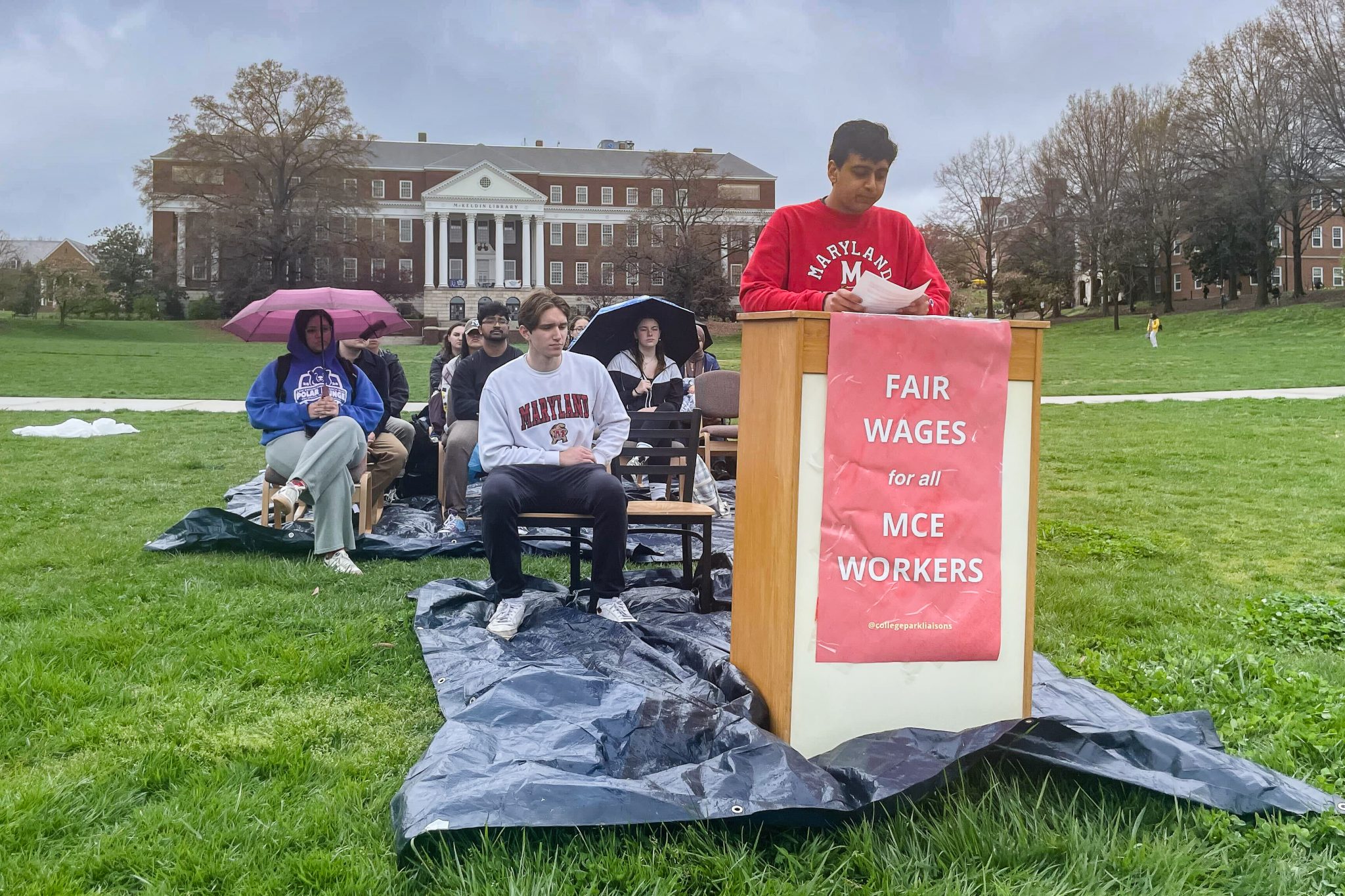Disclaimer: Current student liaison Dhruvak Mirani is a former Diamondback opinion columnist.
University of Maryland student leaders demanded higher wages for incarcerated individuals who work for Maryland Correctional Enterprises Monday at a press conference on McKeldin Mall.
MCE is part of the state’s public safety and correctional services department. The organization consists of incarcerated individuals and offers products and services such as furniture restoration, printing, textiles and meat products, according to the organization’s 2023 annual report.
This university purchased $8.6 million of products made from MCE prison labor across the last three years, according to data obtained by The Diamondback.
About 20 students attended Monday’s press conference, which was organized by the university’s two student liaisons to the College Park City Council with support from the Student Government Association and Residence Hall Association. Attendees sat in chairs found in campus dorms, which event organizers said people in the MCE program often make.
“These chairs you see behind us are the physical manifestation of an inhumane prison labor system,” Gannon Sprinkle, the deputy student liaison and a sophomore government and politics major, said. “As students, we have no choice but to interact with this furniture, using these products of exploitative practices.”
MCE program participants receive nontaxable allowances that average to about $183 a month and daily base stipend bonuses, according to the 2023 MCE report.
Incarcerated people in the MCE program can receive credits that can reduce sentences by up to four months for each year they are involved with the program. The program helps participants “improve work habits, attitudes and skills for the purpose of improving success upon release from a correctional institution,” MCE’s report said.
State law stipulates MCE as the preferred provider of “quality furniture, products and services for use by government and non-profit agencies” for the University System of Maryland.
“[Students’] concern is that the inmates are underpaid. That’s out of our control and we have to abide by state law,” university president Darryll Pines told The Diamondback. “But the other side of the story is that the inmates actually want the employment because it gives them skills.”
[UMD community frustrated about lack of communication on tree-cutting in Guilford Woods]
Several university community members emphasized that Black people are often exploited by entities such as MCE because of their disproportionately high incarceration rates.
In 2023, Black people comprised about 72 percent of Maryland’s prison population, despite making up 30 percent of the state’s population, according to an October news release from the state attorney general’s office. Maryland has the highest percentage of imprisoned Black people in the country, the release said.
Craig Mackel, the president of this university’s Black Engineers Society, told The Diamondback last month that there is a “link and a tie” between MCE and the Black community because of the community’s disproportionate rate of imprisonment.
“That could have been me that made that furniture, right or wrong, just because a lot of the people that made [that] furniture look like me,” the senior civil engineering major said.
Mackel added that it’s disheartening that furniture at this university is made by incarcerated people who are not adequately paid.
Prison labor creates a system that supports racial capitalism, according to African American studies and anthropology professor Joseph Richardson. People must challenge systems that use prison labor to increase corporate profits, he said.
[UMD community concerned about Purple Line construction’s environmental, health impacts]
Solomon Comissiong, Nyumburu Cultural Center’s assistant director of student involvement and public relations, also implored this university to divest from MCE.
Many people who learn a trade in prison are still not able to get hired for jobs because of their past crimes, Comissiong told The Diamondback. Those people are more likely to return to an “illegal underground economy” to earn money, he added.
In 2020, to address this university’s relationship with MCE, multiple student leaders called upon this university to divest from MCE as one of 25 demands to address anti-Black racism.
This university marked the issue as a “sustained commitment” on its dashboard that tracks all 25 demands. It will “continue to study the relationship with Maryland Correctional Enterprises,” according to the dashboard.
Dhruvak Mirani, the other student liaison who organized Monday’s conference, said students are “not really seeing the university fulfill its sustained commitment.”
“They put a checkmark that says sustained commitment on their pledges to our students of color without actually taking the action to back up those empty words,” the sophomore computer science and government and politics major said.
In a statement to The Diamondback, this university said it must remain in accordance with state law and will continue to buy items from MCE unless a waiver is requested and granted by MCE.
“We understand that this is an issue that students have raised for some time, and we continue to listen to our community and hear their concerns on this issue,” the statement read.
Sprinkle has spoken with several state legislators about promoting higher wages for incarcerated people in the program. Bills to provide those wages and remove MCE as the state’s preferred provider have stalled in the Maryland General Assembly in recent sessions.
Richardson said it will require advocacy within the University System of Maryland to urge state legislators to divest.
“It’s going to take a very holistic approach, not lying in the responsibility or accountability for one constituency,” Richardson said. “I think everyone needs to be involved and educated in this fight.”



